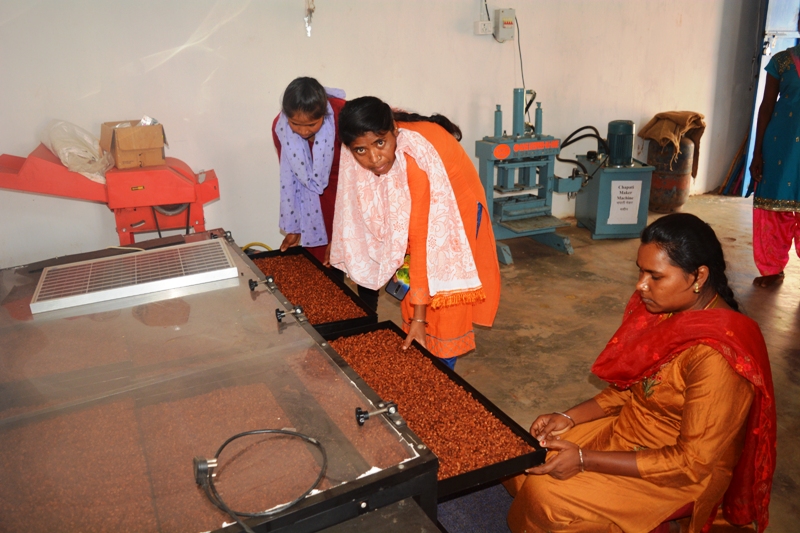The Sangwari Mahila Swasahayta Samuh, a self-help group based in Chhattisgarh, is giving the traditional use of mahua for making liquor a twist by creating value-added products
out of it, writes Deepanwita Gita Niyogi
Come summer, and the grounds of Bastar’s villages are dotted with small pale yellow flowers, which fall from trees. Known as mahua, these are collected by tribal communities during the months of March-April in small baskets. After collection, the flowers are exposed to the sun for a few days during which they turn brown and taste like raisins. It is at this time that the dried flowers are sold in the market where they fetch a good price, sometimes as high as Rs 50-60 per kg.
Mahua, an important minor forest produce in Chhattisgarh, ensures a steady source of livelihood to rural communities, especially Adivasis. Besides selling the dried flowers, a part of it is kept for future use by collectors for making mahua liquor for daily consumption. In fact, drinking mahua liquor is Bastar region’s quintessential culture. It is served to guests on almost all occasions and also sold in bottles across rural markets. But mahua is nutritious too, and can be used to make value-added food products.
And this is where Raziya Shaikh of Bastar Food Firm came in two years ago. Shaikh researched on tribal foods and came up with various interesting recipes prepared from mahua. She had technical knowledge related to products’ shelf life, safety measures and quality parameters. Armed with a degree in microbiology, which has food technology as part of the syllabus, Shaikh trained members of a women’s self-help group based in Dantewada district of Bastar region to bake mahua cookies which have a distinct black colour and sweet taste.
The forest department approached Shaikh and organised a month-long training two years back. Its members were trained on the processing of important minor forest produces like mahua. Primary level processing is important for value addition and centres dedicated to this have been set up across Chhattisgarh.
According to Shaikh, making products is easy but turning it into a business model is difficult. “It took me a year to understand the entire cycle of mahua and make people aware that it can be used in various ways apart from alcohol,” she said.
Shaikh’s idea became a hit and the women of the Sangwari Mahila Swasahayta Samuh started making mahua laddoo, mahua halwa, tamarind sauce, masala gur or jaggery and kodo and kutki cookies. The latter two are small millets.
For this initiative, it is important that only clean food grade mahua flowers are used. Flowers which are traditionally collected from the ground are full of dust, said K Raju, the deputy ranger of Dantewada forest range. To collect the flowers used in making food items nets are used. The nets are tied to trees which ensure that flowers fall in them. Later, collection is carried out twice a day in clean plastic trays and the flowers dried using dryer machines.
One flower, many uses
Besides cookies, mahua laddoos and mahua halwa are much in demand. There are 20 women associated with the Sangwari group formed on November 27, 2020.
Commenting on the formation of her group, leader Malti Kunjam said all members who are currently part of Sangwari initially belonged to other self-help groups, but came together for the mahua initiative. Many of them come to work daily from far-off villages. For their convenience, an e-rickshaw has been provided by the forest department
The products, a good option for the health conscious, are made from whole wheat flour and jaggery. These are sent to Raipur and from there to every district of the state. Initially, the women used to sell the products in the village market.
“The women make up to five kg laddoos and four kg of mahua cookies daily. Several ingredients are needed like chocolate, milk, spices, ghee, butter and cashews. Initially, the forest department supplied the raw materials but now we buy it with the loan amount of Rs 10 lakh received as part of Van Dhan Yojana,” Kunjam added. Van Dhan is a scheme of the central government to increase livelihood opportunities in tribal areas of India.
Till now, the women’s group has earned a profit Rs 3 lakh from the sale of various products. A 100 gm box of mahua cookies costs Rs 70. Same is the price for ones made from millets. The laddoo costs Rs 750 per kg. It is in demand at the Danteshwari temple where it is given as an offering to devotees. Another unique product is tamarind sauce sold in bottles. It costs Rs 60.
There are three rooms in the centre where the women’s self-help group works. One is stacked with finished products. Another has raw materials and a microwave oven for baking cookies. The third room has a de-seeder machine for tamarind seed removal, a solar dryer for drying mahua flowers and other machines. There is also a sauce filler for filling up tamarind sauce in bottles.
A new direction

Kunjam added that nobody in the group had any prior knowledge of baking cookies but now that everyone has learnt, it is a good thing to work together. She is looking forward to expand the activities. The cookies are selling fast. The centre functions on all days except Wednesday when it is shut for the local rural market. “The women get about Rs 100-150 per day for their labour and work from 10.30 am to 5.30 pm,” Kunjam said.
Though mahua cookies are in high demand, the women try to get raw materials as per orders. Dried mahua flowers are kept in cold storage for future use. When used in cookies, it is crushed to make powder. The finished laddoos can be stored for six months and consumed. Kunjam wants to take the products outside Chhattisgarh. Orders would be placed through TRIFED in future.
Apart from Sangwari, the forest department has many self-help groups which are involved in buying mahua and tamarind from Adivasi families. This has been introduced to do away with middlemen who pay less than the minimum support price for minor forest produces. The department transfers money as advance to the women’s groups so that they can make the purchase.
Dantewada divisional forest officer Sundeep Balaga said the intervention is targeted at youths living in cities, who will enjoy mahua in the form of cookies and laddoos rather than the traditional ways of consumption popular in villages. The machines, given to the women for use, are worth Rs 12 lakh and have been procured using DMF funds.
Mahua 16: The members of the Sangwari Mahila Swasahayta Samuh display the products made by them. These include mahua laddoo, mahua halwa, masala gur and millet cookies.
Mahua 17: Freshly baked cookies made of millets and mahua are popular with customers.
Mahua 18: Sun dried mahua is stored like this. The flowers are crushed to a powder form for cookies.













